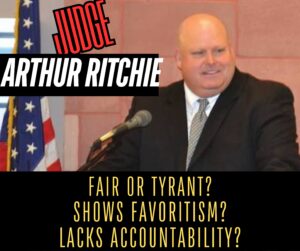Clark County, Nevada — November 9, 2025
For more than two decades, Judge T. Arthur Ritchie Jr. has held one of the most powerful positions in Nevada’s judicial system — the Family Division of the Eighth Judicial District Court, Department H.
Appointed in 1999, Ritchie has presided over thousands of families, fortunes, and futures.
Yet behind the robe and reputation lies a troubling pattern: a judge so comfortable in his position that accountability has all but disappeared from his courtroom.
A Judge Too Comfortable with Power:
Judge Ritchie’s lengthy tenure has given him immense influence over how family law operates in Clark County. Instead of using that influence to promote transparency and reform, he’s fostered a culture where selective enforcement and judicial indifference thrive.
He has allowed litigants to avoid paying court-ordered child support for years — including one case where hundreds of thousands of dollars remain unpaid — yet there has been no enforcement, no contempt hearing, and no accountability.
When a judge ignores his own orders, it sends a chilling message to struggling parents across Nevada:
The system protects the negligent, not the responsible.
This isn’t an isolated lapse in oversight — it’s a reflection of a larger pattern in which Judge Ritchie’s courtroom has lost its moral compass, favoring familiarity and influence over fairness and enforcement.
Favoritism and the Appearance of Bias:
Multiple observers have noted that Judge Ritchie appears to favor specific attorneys — particularly those he knows personally — when they appear as litigants before him.
Such favoritism undermines every notion of judicial neutrality and leaves ordinary citizens convinced that outcomes depend more on who you know than on what’s right.
The ethical standard for judges is clear:
“Not only must justice be done, it must also be seen to be done.”
When personal relationships overlap with professional rulings — when attorney-litigants receive special courtesy or consideration — public confidence in the judiciary erodes completely.
Sealed Cases That Should No Longer Be Sealed:
Judge Ritchie has also drawn quiet criticism for sealing cases long after the legal confidentiality reasons have expired.
In several matters, the children involved are now adults — yet their case files remain sealed, inaccessible to public scrutiny or journalistic review.
There is no justifiable reason for secrecy when the purpose of protecting minors no longer applies. Keeping these records hidden fuels suspicion:
What is this judge trying to keep the public from seeing?
Transparency is the cornerstone of trust in any court of law. When a judge hides the history of his own courtroom — even years later — it’s no longer protection; it’s concealment.
Procedural Precision or Judicial Coldness?
Supporters of Ritchie call him “detail-oriented” and “rule-driven.” But that procedural rigidity often feels more like judicial coldness.
Family court is not corporate litigation. It involves emotion, trauma, and real human pain.
Instead of empathy, many litigants describe being treated with condescension or hostility. Those representing themselves often leave court feeling humiliated, unheard, and unprotected — a far cry from the ideals of family justice.
Even appellate courts have called out Ritchie’s errors. In Myers v. Haskins (2022), the Nevada Supreme Court reversed his ruling, reminding the lower court that due process must come before convenience.
A History of Leadership, but Not of Reform:
As both Presiding and Chief Judge, Ritchie had the power to reshape Clark County’s broken family court culture.
He could have prioritized open hearings, digital transparency, and fair treatment for self-represented litigants. Instead, the same systemic issues persist: locked doors, inconsistent calendars, selective enforcement, and silence when judges fail to act.
Under his leadership, modernization has been administrative rather than ethical.
The deeper issues — favoritism, procedural abuse, and lack of accountability — remain untouched.
A System That Shields Its Own:
Nevada’s judicial discipline system has long been criticized as insular and ineffective.
Judges like Ritchie rarely face serious scrutiny because the mechanisms designed to police misconduct are controlled by the same insiders who benefit from inaction.
Complaints vanish quietly. Critics are ignored. Litigants fear retaliation.
And those with influence — attorneys and officials who socialize with the judiciary — glide through unscathed.
That is the very definition of a self-protecting system.
And at its center sits Judge Arthur Ritchie.
Disconnected from the Families He Judges:
Over time, Judge Ritchie appears to have grown detached from the real-world struggles of the families before him.
Veterans suffering from PTSD, parents barely scraping by, and survivors of abuse too often leave his courtroom feeling broken rather than heard.
When a judge becomes indifferent to the lives he’s impacting — when his courtroom becomes a chamber of compliance instead of compassion — justice turns mechanical, and mercy disappears.
Time for Accountability and New Leadership:
No one disputes Judge Ritchie’s education or intellect. But experience without reflection is stagnation.
After more than two decades on the bench, Clark County deserves a judge who enforces his own orders, treats every litigant equally, and opens his courtroom to public oversight.
Allowing child-support evasion, shielding favored attorneys, and sealing outdated files aren’t the habits of a fair judge — they’re the hallmarks of one who has forgotten what fairness looks like.
The Verdict:
Judge T. Arthur Ritchie Jr. has had a long career — but not necessarily a just one.
For too long, he’s operated with the confidence of someone who knows the system won’t challenge him. But the tide is turning.
Nevadans are watching. Litigants are speaking out. And the families who have suffered under inconsistent enforcement and selective justice are demanding answers.
Because in the end, the law is only as strong as the people brave enough to hold its judges accountable.
🎥 Related Interview:
Here is an interview with a litigant whom Judge Ritchie completely sided with, ignoring all child-support obligations:
Tara Kellogg: Victim of Family Court Torture by Nevada Attorney Alex Ghibaudo & Judge Arthur Ritchie
📺 Watch on YouTube
About Veterans In Politics International (VIPI):
Veterans In Politics International (VIPI) is a non-partisan organization dedicated to ensuring integrity, transparency, and accountability in Nevada’s courts and public institutions. Through its Court Observation Program, VIPI works to ensure that every Nevadan’s right to fair and open justice is protected.
For more information, visit: https://veteransinpolitics.org









